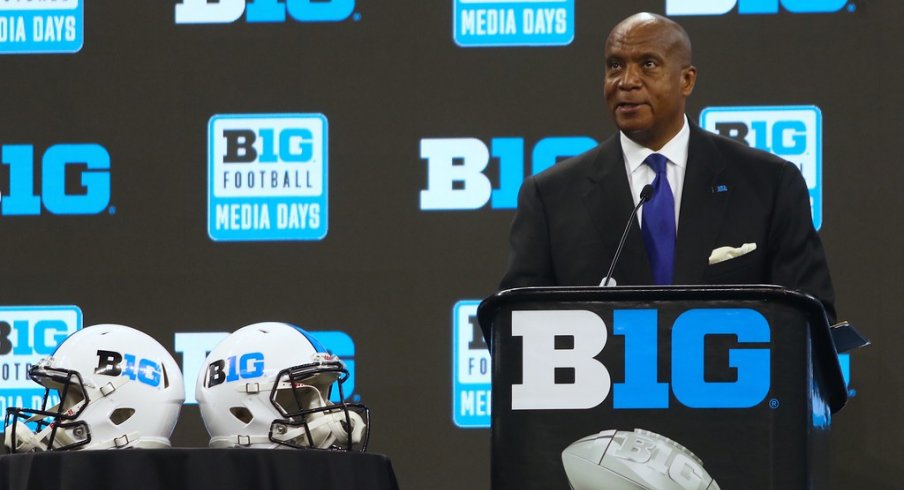After announcing an alliance between the Big Ten, ACC and Pac-12 Tuesday, commissioners from each conference participated in a joint video conference with the media to discuss the new partnership.
Big Ten commissioner Kevin Warren, ACC commissioner Jim Phillips and Pac-12 commissioner George Kliavkoff all weighed in on how the alliance could impact the landscape of college athletics, discussing how soon crossover games may be scheduled, how the conferences feel about the 12-team College Football Playoff expansion proposal, whether or not legal documents pertaining to the alliance have been signed and where the Big 12 fits into things.
Here’s a rundown of how one or more of the aforementioned commissioners answered the burning questions surrounding the alliance just minutes after its official announcement.
How soon could crossover games be scheduled?
In Tuesday’s joint press release, the conferences announced that the alliance will include a scheduling component for football and women’s and men’s basketball “designed to create new inter-conference games.”
However, the pre-existing TV contracts held from one conference to the next may delay that process significantly. Warren said that all current contracts in place for non-conference games will be seen through.
“We’re not gonna interfere with any existing contracts that exist. So this is not about getting out of contracts and blowing anything up,” Warren said. “This is about honoring those existing contracts, but also building relationships between these three like-minded conferences as we look forward from a scheduling standpoint.”
Warren emphasized that there are already plenty of matchups in place between all three conferences in a variety of sports as is, and said that on the football side of things alone, there are 68 games on the schedule across the Big Ten, ACC and Pac-12 from 2022 to 2035. That number does not include Notre Dame, Warren said.
“We already have some existing relationships between the ACC and the Pac-12 and the Big Ten,” Warren said. “Starting with basketball, we have an ACC-Big Ten challenge. With the Pac-12 we have a volleyball relationship that we’ve been able to build with them. And then from a football standpoint, you think about Sept. 11 this year. We have Oregon who will be playing at Ohio State and Washington who will be playing at Michigan.”
Have legal documents been signed?
Although the three conferences have come to what was labeled a “historic” alliance in the press release, there has been no legal documentation signed. In fact, Kliavkoff said there will be no need for it.
“There’s no signed contract. There’s an agreement among three gentlemen, and there is a commitment from 41 presidents and chancellors and 41 athletic directors to do what we say we’re going to do,” Kliavkoff said. “If there’s any lack of specificity in the press release, it’s because we wanted to make sure we could deliver 100 percent of what we promised. So we’re aligned in how we want to approach this, but there’s no contract, there’s no signed document, and there doesn’t need to be.”
When asked how the alliance could stop a certain team or conference from going outside its boundaries, Phillips said “it’s about trust.”
“If that’s what it takes to get something considerable done, then we’ve lost our way,” Phillips said.
How did SEC expansion impact this decision?
The news that Texas and Oklahoma are set to leave the Big 12 and join forces with the SEC shook up the college football landscape in July, and jumpstarted serious conversations about realignment between conference administrators around the country.
However, Warren said the alliance is not a direct response to the recent moves by the SEC.
“I wouldn’t say this is a reaction to Texas and Oklahoma joining the SEC, but I think to be totally candid, you have to evaluate what’s going on in the landscape of college athletics,” he said.
Warren said there are no tensions between the conferences in the alliance and the SEC, and that the Power Five conference commissioners regularly talk on the phone. However, SEC expansion did serve as something of a call to action for the Big Ten, ACC and Pac-12 in terms of considering the future of college sports, Warren said.
“I think what that is that allowed all of us in college athletics to maybe take a step back and take a step forward to really start evaluating what will the next one, three, five, seven, 10, 15 years look like in college athletics,” Warren said.
Where does the Big 12 go from here?
With the SEC growing stronger due to the addition of Texas and Oklahoma and the Big Ten, ACC and Pac-12 aligning on Tuesday, the Big 12 appears to be the odd conference out as far as the Power Five is concerned.
Warren said he is confident in Big 12 commissioner Bob Bowlsby’s ability to do what is best for the conference, but Phillips made plain that the alliance is invested in the success of the conference as it pertains to the maintenance of the current model of collegiate athletics.
“Let me put it directly; we want and need the Big 12 to do well,” Phillips said. “The Big 12 matters in college athletics. The Big 12 matters in Power Five athletics, in our FBS group. And so I can just tell you we’ll be watching what occurs here."
Thoughts on CFP expansion?
The alliance has been reported to be formed in part to give the Big Ten, ACC and Big 12 more say in the wider questions facing college football and athletics in general, with one such topic being the recently proposed 12-team College Football Playoff expansion.
Warren, Phillips and Kliavkoff all weighed in with their updated thoughts on the CFP expansion proposal as it stands, but all three said they must continue to have conversations with administrators, coaches and players across their conferences before coming to a final decision regarding where they stand on the issue.
Kliavkoff said the Pac-12 is “100 percent in favor” of expanding the CFP, but that there are “issues in the margins” that need to be resolved through further exploration.
“We’re going through a process, as both of my colleagues mentioned, and for me that means condensing my visits to every single school so that they are terminated by Sept. 28, so I can get face-to-face feedback from every one of our universities,” Kliavkoff said.


